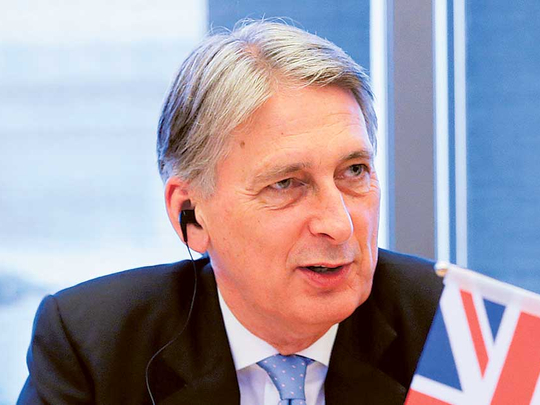
London: Chancellor of the Exchequer Philip Hammond is ready to accept that Britain may have to give up membership of the European Union’s single market — and UK banks’ crucial access to clients on the continent — to achieve the immigration restrictions that voters have demanded, according to two officials familiar with his thinking.
With the government staking its credibility on regaining control over UK borders after the June 23 Brexit vote, Hammond considers it unrealistic to expect actual membership of the single market after Britain leaves the EU, the officials said, speaking on condition of anonymity because the discussions were private. Instead, Treasury staff are drawing up their own blueprint which they hope will allow Britain’s financial services firms to retain similar levels of access to Europe, the officials said.
The pound extended its losses on the news, falling as much as 1.6 per cent to $1.3028, its lowest since August 19.
Hammond’s plan hinges on the argument he set out earlier this month that London as a financial centre is too valuable for the EU to jeopardise, since many European companies use its markets to raise capital.
“I genuinely believe London delivers not only for the UK, but the European Union as a whole,” Hammond told a House of Lords Committee on September 8. He has also said he wants to win “the best deal” for companies “including our world leading financial services industry.”
A Treasury spokesperson said in a statement that its position is clear and that it wants Britain to remain a great place for financial services. It stands ready to help the sector maximise the opportunities that leaving the EU presents, the spokesperson added.
EU leaders meeting in Bratislava without a UK delegation for the first time in four decades expressed doubt that the British would surrender access to the market. “I can’t even believe that it is possible, it is too important for them,” EU President Donald Tusk said.
Still, the officials reiterated that the British can’t cherry pick by staying in the market and curtailing freedom of labour movement.
“Nobody is prepared to put in doubt the fundamental principles of the European Union,” European Parliament President Martin Schulz told reporters. Slovak Prime Minister Robert Fico also said the EU should ensure it doesn’t “damage our interests” by granting too many concessions to the British.
Negotiations are nearing with Tusk citing Prime Minister Theresa May as telling him she is likely to trigger them in January or February. Foreign Secretary Boris Johnson also identified early-2017 as a probable start date when he met his Italian counterpart this week, according to an official familiar with the conversation.
Pressure is mounting on May at home. Diane James, the new leader of the UK Independence Party, warned on Friday that the prime minister must “stop the faff, stop the fudge and the farce and get on with it.”
The chancellor, who was in favour of staying in the EU before the referendum, has been meeting senior bankers in recent weeks to discuss his plans and is trying to convince them that he can match the benefits of full single market access, the officials said. Some sectors of the industry remain much more concerned than others about the threat of losing their current privileges, according to one of the officials.
US Banks
British access to the single market is of greater significance for global investment banks such as JPMorgan Chase & Co. and Morgan Stanley, which operate European business out of London and don’t have the same links to the continent as local lenders such as Societe Generale SA and Deutsche Bank AG.
Under the existing EU rules, so-called banking passports allow lenders in the UK to provide services and raise funds in the rest of the EU, a crucial plank of business for many firms in the City of London. Executives from JPMorgan Chase & Co. and UBS Group AG have warned that failure to maintain the status quo could force them to cut British jobs.
Transitional Deal
Bankers are lobbying the government to secure a temporary deal that will guarantee them similar provisions to those they enjoy now if there is a gap between the UK leaving the EU and agreeing a new free trade accord.
Some staff in the Treasury are also concerned that two years — the deadline for leaving the EU once Britain starts the process — won’t leave enough time to draft new rules, one of the officials said.
“Our No. 1 message is that if there is going to be a change we need a sensible period of transition,” Robert Rooney, chief executive officer of Morgan Stanley International, said in an interview this week.
There are also concerns about the consequences of Britain potentially exiting the EU customs union. Trade Secretary Liam Fox and Brexit Secretary David Davis are in favour of abandoning that agreement before the Brexit process even starts to give them a freer hand to negotiate with other countries, according to one of the officials. Membership of the customs union could impair Britain’s ability to secure trade agreements because the EU brokers external tariffs and trade deals on behalf of its members.












